ENGT5115 - SDG 7: Role of Energy in Achieving Development Goals
VerifiedAdded on 2023/04/21
|9
|2208
|213
Essay
AI Summary
This essay explores the crucial role of energy, particularly through Sustainable Development Goal 7 (SDG 7), in achieving broader sustainable development goals. It highlights how energy supports various economic and developmental activities, enabling progress in areas like education, healthcare, and poverty reduction. The essay also addresses challenges such as governance issues, limitations of renewable energy resources, and funding constraints that hinder the implementation of SDGs. It proposes solutions including technological advancements, global funds, research collaboration, and robust monitoring systems to ensure the universal applicability and benefits of sustainable development goals. The author concludes that while energy is vital, its success depends on collaboration with factors like governance, finance, and technology.
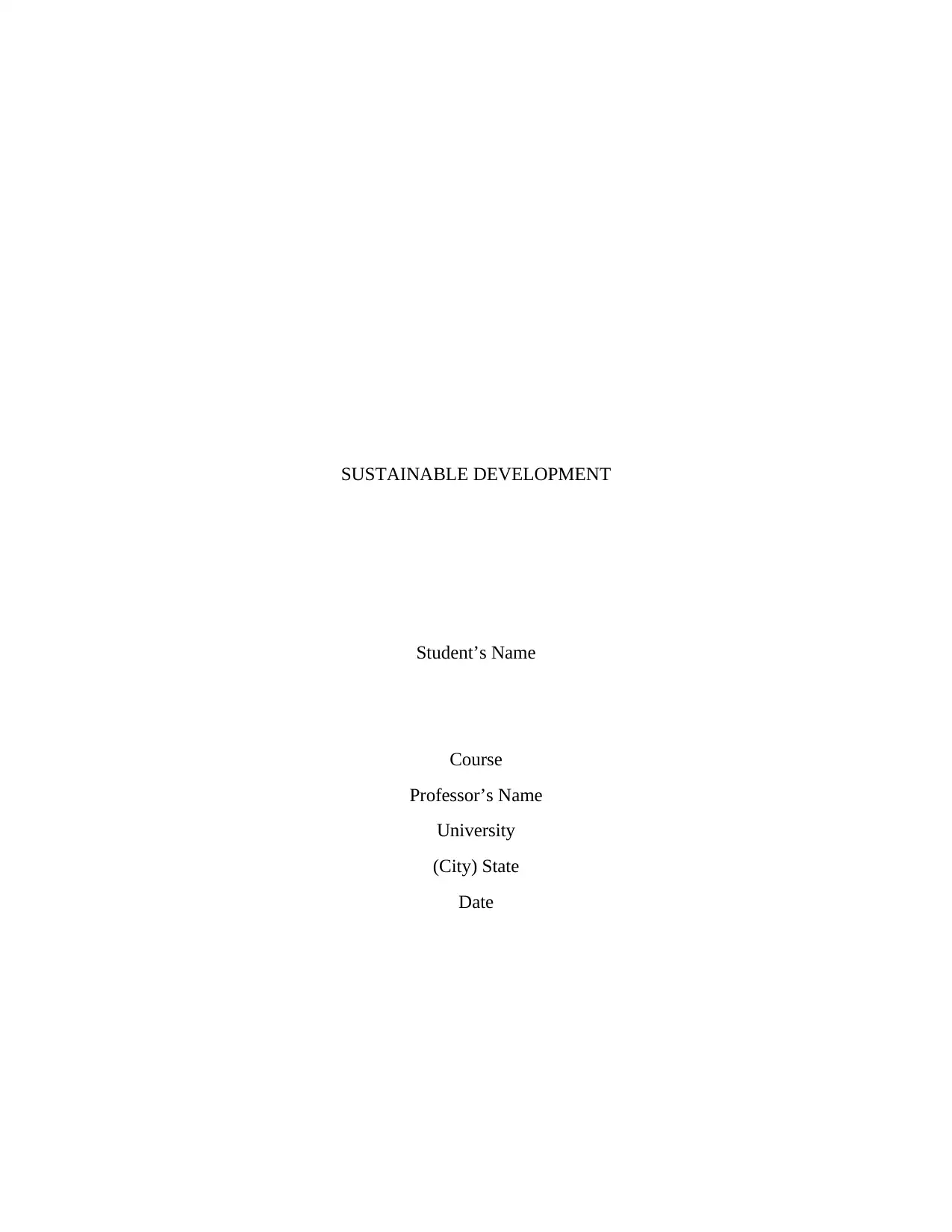
SUSTAINABLE DEVELOPMENT
Student’s Name
Course
Professor’s Name
University
(City) State
Date
Student’s Name
Course
Professor’s Name
University
(City) State
Date
Paraphrase This Document
Need a fresh take? Get an instant paraphrase of this document with our AI Paraphraser
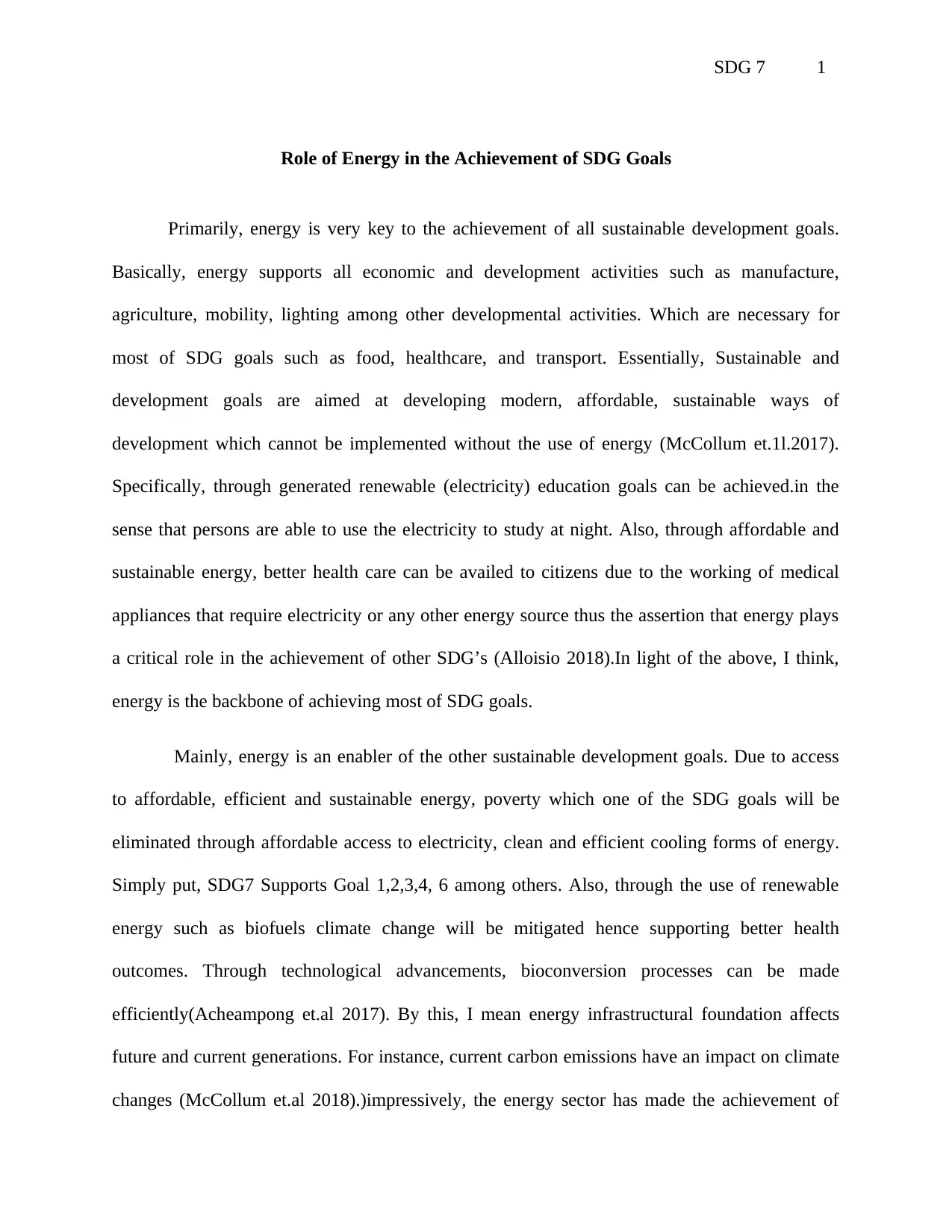
SDG 7 1
Role of Energy in the Achievement of SDG Goals
Primarily, energy is very key to the achievement of all sustainable development goals.
Basically, energy supports all economic and development activities such as manufacture,
agriculture, mobility, lighting among other developmental activities. Which are necessary for
most of SDG goals such as food, healthcare, and transport. Essentially, Sustainable and
development goals are aimed at developing modern, affordable, sustainable ways of
development which cannot be implemented without the use of energy (McCollum et.1l.2017).
Specifically, through generated renewable (electricity) education goals can be achieved.in the
sense that persons are able to use the electricity to study at night. Also, through affordable and
sustainable energy, better health care can be availed to citizens due to the working of medical
appliances that require electricity or any other energy source thus the assertion that energy plays
a critical role in the achievement of other SDG’s (Alloisio 2018).In light of the above, I think,
energy is the backbone of achieving most of SDG goals.
Mainly, energy is an enabler of the other sustainable development goals. Due to access
to affordable, efficient and sustainable energy, poverty which one of the SDG goals will be
eliminated through affordable access to electricity, clean and efficient cooling forms of energy.
Simply put, SDG7 Supports Goal 1,2,3,4, 6 among others. Also, through the use of renewable
energy such as biofuels climate change will be mitigated hence supporting better health
outcomes. Through technological advancements, bioconversion processes can be made
efficiently(Acheampong et.al 2017). By this, I mean energy infrastructural foundation affects
future and current generations. For instance, current carbon emissions have an impact on climate
changes (McCollum et.al 2018).)impressively, the energy sector has made the achievement of
Role of Energy in the Achievement of SDG Goals
Primarily, energy is very key to the achievement of all sustainable development goals.
Basically, energy supports all economic and development activities such as manufacture,
agriculture, mobility, lighting among other developmental activities. Which are necessary for
most of SDG goals such as food, healthcare, and transport. Essentially, Sustainable and
development goals are aimed at developing modern, affordable, sustainable ways of
development which cannot be implemented without the use of energy (McCollum et.1l.2017).
Specifically, through generated renewable (electricity) education goals can be achieved.in the
sense that persons are able to use the electricity to study at night. Also, through affordable and
sustainable energy, better health care can be availed to citizens due to the working of medical
appliances that require electricity or any other energy source thus the assertion that energy plays
a critical role in the achievement of other SDG’s (Alloisio 2018).In light of the above, I think,
energy is the backbone of achieving most of SDG goals.
Mainly, energy is an enabler of the other sustainable development goals. Due to access
to affordable, efficient and sustainable energy, poverty which one of the SDG goals will be
eliminated through affordable access to electricity, clean and efficient cooling forms of energy.
Simply put, SDG7 Supports Goal 1,2,3,4, 6 among others. Also, through the use of renewable
energy such as biofuels climate change will be mitigated hence supporting better health
outcomes. Through technological advancements, bioconversion processes can be made
efficiently(Acheampong et.al 2017). By this, I mean energy infrastructural foundation affects
future and current generations. For instance, current carbon emissions have an impact on climate
changes (McCollum et.al 2018).)impressively, the energy sector has made the achievement of
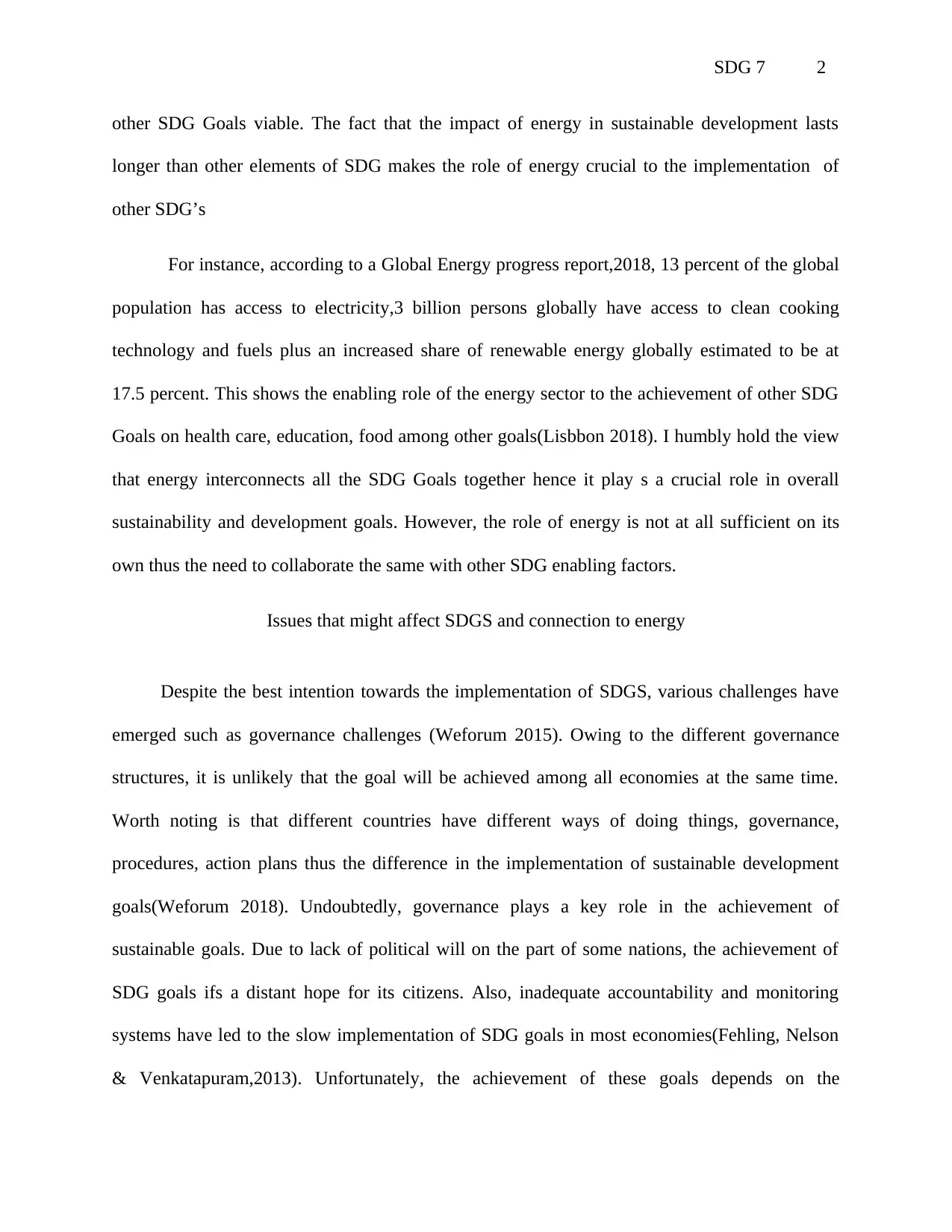
SDG 7 2
other SDG Goals viable. The fact that the impact of energy in sustainable development lasts
longer than other elements of SDG makes the role of energy crucial to the implementation of
other SDG’s
For instance, according to a Global Energy progress report,2018, 13 percent of the global
population has access to electricity,3 billion persons globally have access to clean cooking
technology and fuels plus an increased share of renewable energy globally estimated to be at
17.5 percent. This shows the enabling role of the energy sector to the achievement of other SDG
Goals on health care, education, food among other goals(Lisbbon 2018). I humbly hold the view
that energy interconnects all the SDG Goals together hence it play s a crucial role in overall
sustainability and development goals. However, the role of energy is not at all sufficient on its
own thus the need to collaborate the same with other SDG enabling factors.
Issues that might affect SDGS and connection to energy
Despite the best intention towards the implementation of SDGS, various challenges have
emerged such as governance challenges (Weforum 2015). Owing to the different governance
structures, it is unlikely that the goal will be achieved among all economies at the same time.
Worth noting is that different countries have different ways of doing things, governance,
procedures, action plans thus the difference in the implementation of sustainable development
goals(Weforum 2018). Undoubtedly, governance plays a key role in the achievement of
sustainable goals. Due to lack of political will on the part of some nations, the achievement of
SDG goals ifs a distant hope for its citizens. Also, inadequate accountability and monitoring
systems have led to the slow implementation of SDG goals in most economies(Fehling, Nelson
& Venkatapuram,2013). Unfortunately, the achievement of these goals depends on the
other SDG Goals viable. The fact that the impact of energy in sustainable development lasts
longer than other elements of SDG makes the role of energy crucial to the implementation of
other SDG’s
For instance, according to a Global Energy progress report,2018, 13 percent of the global
population has access to electricity,3 billion persons globally have access to clean cooking
technology and fuels plus an increased share of renewable energy globally estimated to be at
17.5 percent. This shows the enabling role of the energy sector to the achievement of other SDG
Goals on health care, education, food among other goals(Lisbbon 2018). I humbly hold the view
that energy interconnects all the SDG Goals together hence it play s a crucial role in overall
sustainability and development goals. However, the role of energy is not at all sufficient on its
own thus the need to collaborate the same with other SDG enabling factors.
Issues that might affect SDGS and connection to energy
Despite the best intention towards the implementation of SDGS, various challenges have
emerged such as governance challenges (Weforum 2015). Owing to the different governance
structures, it is unlikely that the goal will be achieved among all economies at the same time.
Worth noting is that different countries have different ways of doing things, governance,
procedures, action plans thus the difference in the implementation of sustainable development
goals(Weforum 2018). Undoubtedly, governance plays a key role in the achievement of
sustainable goals. Due to lack of political will on the part of some nations, the achievement of
SDG goals ifs a distant hope for its citizens. Also, inadequate accountability and monitoring
systems have led to the slow implementation of SDG goals in most economies(Fehling, Nelson
& Venkatapuram,2013). Unfortunately, the achievement of these goals depends on the
⊘ This is a preview!⊘
Do you want full access?
Subscribe today to unlock all pages.

Trusted by 1+ million students worldwide
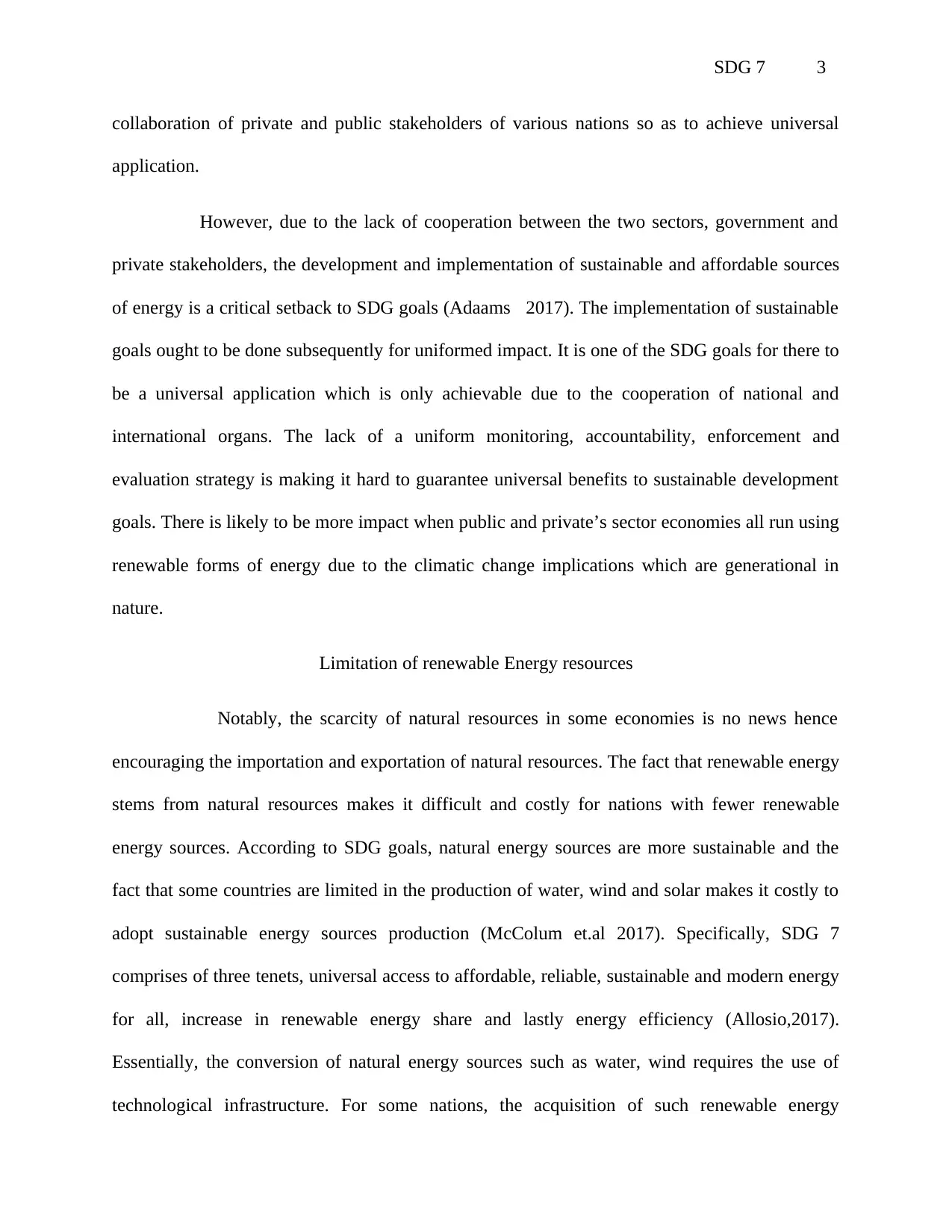
SDG 7 3
collaboration of private and public stakeholders of various nations so as to achieve universal
application.
However, due to the lack of cooperation between the two sectors, government and
private stakeholders, the development and implementation of sustainable and affordable sources
of energy is a critical setback to SDG goals (Adaams 2017). The implementation of sustainable
goals ought to be done subsequently for uniformed impact. It is one of the SDG goals for there to
be a universal application which is only achievable due to the cooperation of national and
international organs. The lack of a uniform monitoring, accountability, enforcement and
evaluation strategy is making it hard to guarantee universal benefits to sustainable development
goals. There is likely to be more impact when public and private’s sector economies all run using
renewable forms of energy due to the climatic change implications which are generational in
nature.
Limitation of renewable Energy resources
Notably, the scarcity of natural resources in some economies is no news hence
encouraging the importation and exportation of natural resources. The fact that renewable energy
stems from natural resources makes it difficult and costly for nations with fewer renewable
energy sources. According to SDG goals, natural energy sources are more sustainable and the
fact that some countries are limited in the production of water, wind and solar makes it costly to
adopt sustainable energy sources production (McColum et.al 2017). Specifically, SDG 7
comprises of three tenets, universal access to affordable, reliable, sustainable and modern energy
for all, increase in renewable energy share and lastly energy efficiency (Allosio,2017).
Essentially, the conversion of natural energy sources such as water, wind requires the use of
technological infrastructure. For some nations, the acquisition of such renewable energy
collaboration of private and public stakeholders of various nations so as to achieve universal
application.
However, due to the lack of cooperation between the two sectors, government and
private stakeholders, the development and implementation of sustainable and affordable sources
of energy is a critical setback to SDG goals (Adaams 2017). The implementation of sustainable
goals ought to be done subsequently for uniformed impact. It is one of the SDG goals for there to
be a universal application which is only achievable due to the cooperation of national and
international organs. The lack of a uniform monitoring, accountability, enforcement and
evaluation strategy is making it hard to guarantee universal benefits to sustainable development
goals. There is likely to be more impact when public and private’s sector economies all run using
renewable forms of energy due to the climatic change implications which are generational in
nature.
Limitation of renewable Energy resources
Notably, the scarcity of natural resources in some economies is no news hence
encouraging the importation and exportation of natural resources. The fact that renewable energy
stems from natural resources makes it difficult and costly for nations with fewer renewable
energy sources. According to SDG goals, natural energy sources are more sustainable and the
fact that some countries are limited in the production of water, wind and solar makes it costly to
adopt sustainable energy sources production (McColum et.al 2017). Specifically, SDG 7
comprises of three tenets, universal access to affordable, reliable, sustainable and modern energy
for all, increase in renewable energy share and lastly energy efficiency (Allosio,2017).
Essentially, the conversion of natural energy sources such as water, wind requires the use of
technological infrastructure. For some nations, the acquisition of such renewable energy
Paraphrase This Document
Need a fresh take? Get an instant paraphrase of this document with our AI Paraphraser
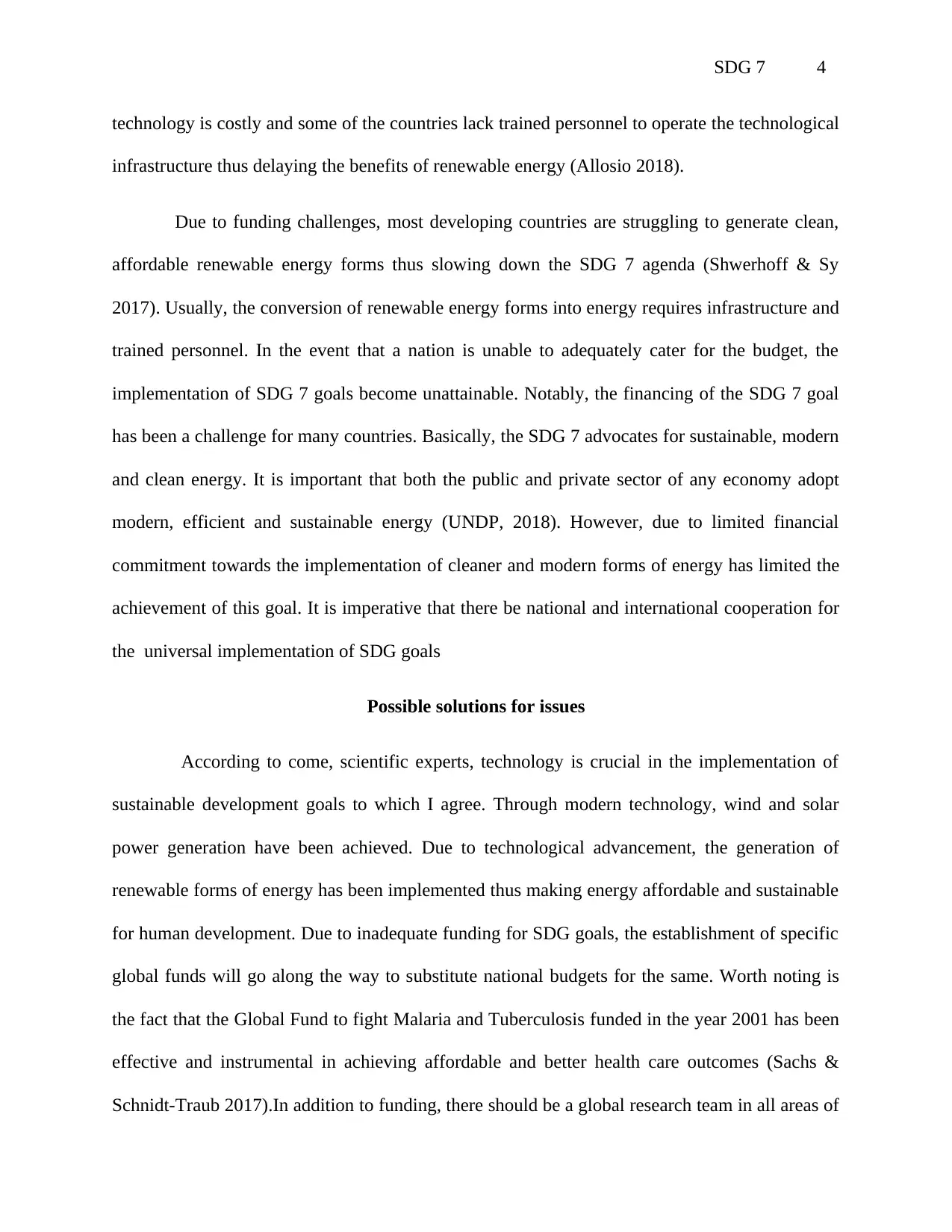
SDG 7 4
technology is costly and some of the countries lack trained personnel to operate the technological
infrastructure thus delaying the benefits of renewable energy (Allosio 2018).
Due to funding challenges, most developing countries are struggling to generate clean,
affordable renewable energy forms thus slowing down the SDG 7 agenda (Shwerhoff & Sy
2017). Usually, the conversion of renewable energy forms into energy requires infrastructure and
trained personnel. In the event that a nation is unable to adequately cater for the budget, the
implementation of SDG 7 goals become unattainable. Notably, the financing of the SDG 7 goal
has been a challenge for many countries. Basically, the SDG 7 advocates for sustainable, modern
and clean energy. It is important that both the public and private sector of any economy adopt
modern, efficient and sustainable energy (UNDP, 2018). However, due to limited financial
commitment towards the implementation of cleaner and modern forms of energy has limited the
achievement of this goal. It is imperative that there be national and international cooperation for
the universal implementation of SDG goals
Possible solutions for issues
According to come, scientific experts, technology is crucial in the implementation of
sustainable development goals to which I agree. Through modern technology, wind and solar
power generation have been achieved. Due to technological advancement, the generation of
renewable forms of energy has been implemented thus making energy affordable and sustainable
for human development. Due to inadequate funding for SDG goals, the establishment of specific
global funds will go along the way to substitute national budgets for the same. Worth noting is
the fact that the Global Fund to fight Malaria and Tuberculosis funded in the year 2001 has been
effective and instrumental in achieving affordable and better health care outcomes (Sachs &
Schnidt-Traub 2017).In addition to funding, there should be a global research team in all areas of
technology is costly and some of the countries lack trained personnel to operate the technological
infrastructure thus delaying the benefits of renewable energy (Allosio 2018).
Due to funding challenges, most developing countries are struggling to generate clean,
affordable renewable energy forms thus slowing down the SDG 7 agenda (Shwerhoff & Sy
2017). Usually, the conversion of renewable energy forms into energy requires infrastructure and
trained personnel. In the event that a nation is unable to adequately cater for the budget, the
implementation of SDG 7 goals become unattainable. Notably, the financing of the SDG 7 goal
has been a challenge for many countries. Basically, the SDG 7 advocates for sustainable, modern
and clean energy. It is important that both the public and private sector of any economy adopt
modern, efficient and sustainable energy (UNDP, 2018). However, due to limited financial
commitment towards the implementation of cleaner and modern forms of energy has limited the
achievement of this goal. It is imperative that there be national and international cooperation for
the universal implementation of SDG goals
Possible solutions for issues
According to come, scientific experts, technology is crucial in the implementation of
sustainable development goals to which I agree. Through modern technology, wind and solar
power generation have been achieved. Due to technological advancement, the generation of
renewable forms of energy has been implemented thus making energy affordable and sustainable
for human development. Due to inadequate funding for SDG goals, the establishment of specific
global funds will go along the way to substitute national budgets for the same. Worth noting is
the fact that the Global Fund to fight Malaria and Tuberculosis funded in the year 2001 has been
effective and instrumental in achieving affordable and better health care outcomes (Sachs &
Schnidt-Traub 2017).In addition to funding, there should be a global research team in all areas of
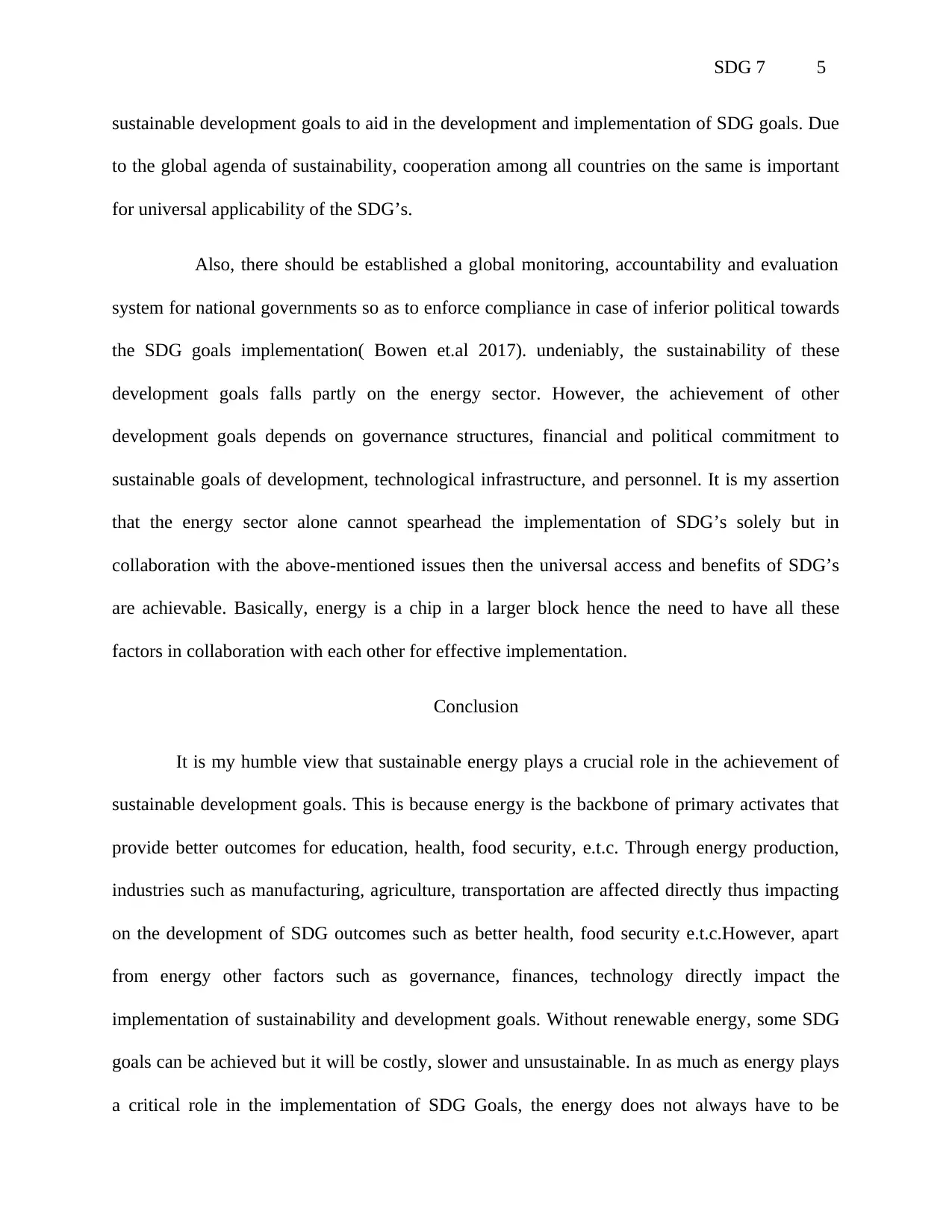
SDG 7 5
sustainable development goals to aid in the development and implementation of SDG goals. Due
to the global agenda of sustainability, cooperation among all countries on the same is important
for universal applicability of the SDG’s.
Also, there should be established a global monitoring, accountability and evaluation
system for national governments so as to enforce compliance in case of inferior political towards
the SDG goals implementation( Bowen et.al 2017). undeniably, the sustainability of these
development goals falls partly on the energy sector. However, the achievement of other
development goals depends on governance structures, financial and political commitment to
sustainable goals of development, technological infrastructure, and personnel. It is my assertion
that the energy sector alone cannot spearhead the implementation of SDG’s solely but in
collaboration with the above-mentioned issues then the universal access and benefits of SDG’s
are achievable. Basically, energy is a chip in a larger block hence the need to have all these
factors in collaboration with each other for effective implementation.
Conclusion
It is my humble view that sustainable energy plays a crucial role in the achievement of
sustainable development goals. This is because energy is the backbone of primary activates that
provide better outcomes for education, health, food security, e.t.c. Through energy production,
industries such as manufacturing, agriculture, transportation are affected directly thus impacting
on the development of SDG outcomes such as better health, food security e.t.c.However, apart
from energy other factors such as governance, finances, technology directly impact the
implementation of sustainability and development goals. Without renewable energy, some SDG
goals can be achieved but it will be costly, slower and unsustainable. In as much as energy plays
a critical role in the implementation of SDG Goals, the energy does not always have to be
sustainable development goals to aid in the development and implementation of SDG goals. Due
to the global agenda of sustainability, cooperation among all countries on the same is important
for universal applicability of the SDG’s.
Also, there should be established a global monitoring, accountability and evaluation
system for national governments so as to enforce compliance in case of inferior political towards
the SDG goals implementation( Bowen et.al 2017). undeniably, the sustainability of these
development goals falls partly on the energy sector. However, the achievement of other
development goals depends on governance structures, financial and political commitment to
sustainable goals of development, technological infrastructure, and personnel. It is my assertion
that the energy sector alone cannot spearhead the implementation of SDG’s solely but in
collaboration with the above-mentioned issues then the universal access and benefits of SDG’s
are achievable. Basically, energy is a chip in a larger block hence the need to have all these
factors in collaboration with each other for effective implementation.
Conclusion
It is my humble view that sustainable energy plays a crucial role in the achievement of
sustainable development goals. This is because energy is the backbone of primary activates that
provide better outcomes for education, health, food security, e.t.c. Through energy production,
industries such as manufacturing, agriculture, transportation are affected directly thus impacting
on the development of SDG outcomes such as better health, food security e.t.c.However, apart
from energy other factors such as governance, finances, technology directly impact the
implementation of sustainability and development goals. Without renewable energy, some SDG
goals can be achieved but it will be costly, slower and unsustainable. In as much as energy plays
a critical role in the implementation of SDG Goals, the energy does not always have to be
⊘ This is a preview!⊘
Do you want full access?
Subscribe today to unlock all pages.

Trusted by 1+ million students worldwide

SDG 7 6
renewable. However, the use of nonrenewable, inefficient forms of energy will slow down the
achievement of sustainable development. Overall, energy plays a crucial role in the SDG agenda
but its success relies on other factors.
renewable. However, the use of nonrenewable, inefficient forms of energy will slow down the
achievement of sustainable development. Overall, energy plays a crucial role in the SDG agenda
but its success relies on other factors.
Paraphrase This Document
Need a fresh take? Get an instant paraphrase of this document with our AI Paraphraser
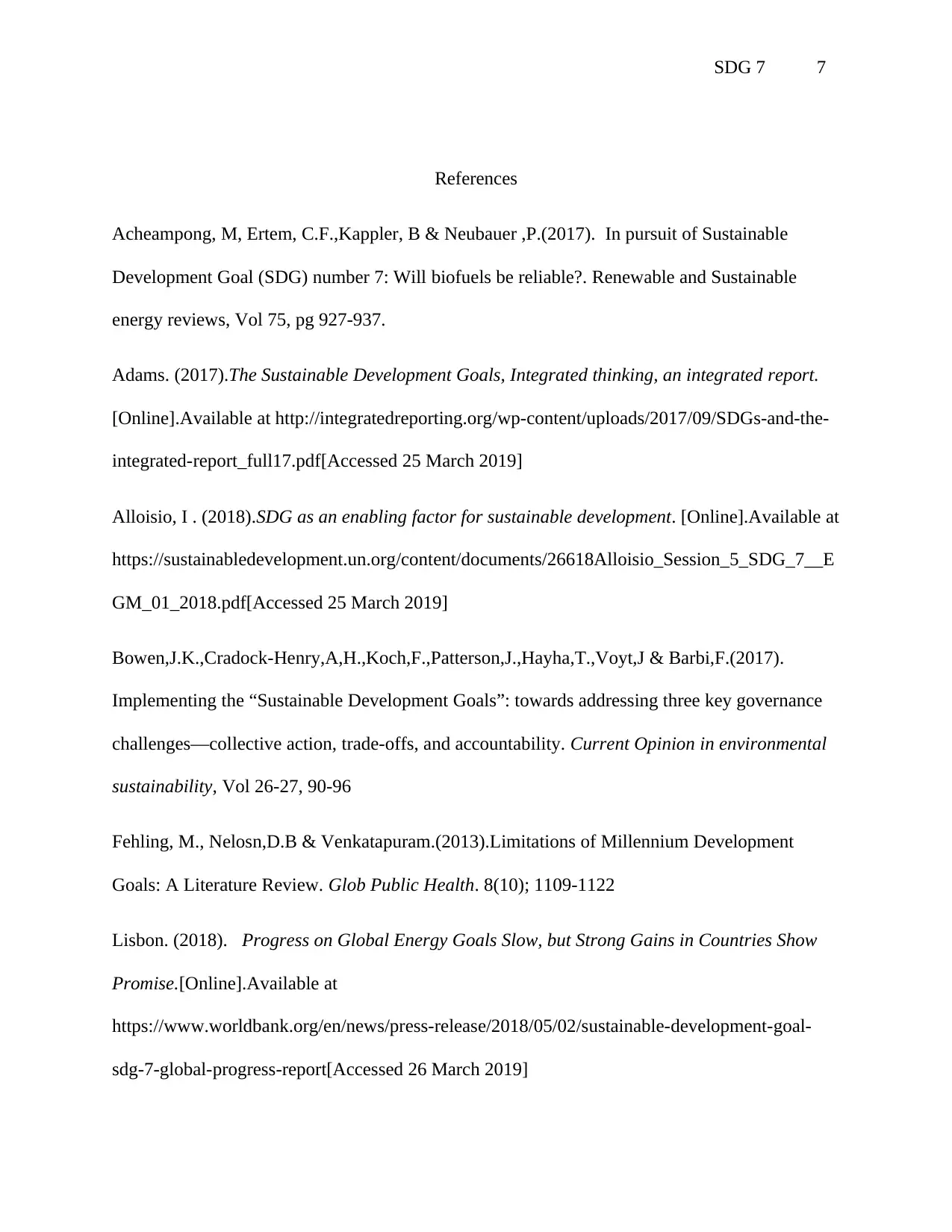
SDG 7 7
References
Acheampong, M, Ertem, C.F.,Kappler, B & Neubauer ,P.(2017). In pursuit of Sustainable
Development Goal (SDG) number 7: Will biofuels be reliable?. Renewable and Sustainable
energy reviews, Vol 75, pg 927-937.
Adams. (2017).The Sustainable Development Goals, Integrated thinking, an integrated report.
[Online].Available at http://integratedreporting.org/wp-content/uploads/2017/09/SDGs-and-the-
integrated-report_full17.pdf[Accessed 25 March 2019]
Alloisio, I . (2018).SDG as an enabling factor for sustainable development. [Online].Available at
https://sustainabledevelopment.un.org/content/documents/26618Alloisio_Session_5_SDG_7__E
GM_01_2018.pdf[Accessed 25 March 2019]
Bowen,J.K.,Cradock-Henry,A,H.,Koch,F.,Patterson,J.,Hayha,T.,Voyt,J & Barbi,F.(2017).
Implementing the “Sustainable Development Goals”: towards addressing three key governance
challenges—collective action, trade-offs, and accountability. Current Opinion in environmental
sustainability, Vol 26-27, 90-96
Fehling, M., Nelosn,D.B & Venkatapuram.(2013).Limitations of Millennium Development
Goals: A Literature Review. Glob Public Health. 8(10); 1109-1122
Lisbon. (2018). Progress on Global Energy Goals Slow, but Strong Gains in Countries Show
Promise.[Online].Available at
https://www.worldbank.org/en/news/press-release/2018/05/02/sustainable-development-goal-
sdg-7-global-progress-report[Accessed 26 March 2019]
References
Acheampong, M, Ertem, C.F.,Kappler, B & Neubauer ,P.(2017). In pursuit of Sustainable
Development Goal (SDG) number 7: Will biofuels be reliable?. Renewable and Sustainable
energy reviews, Vol 75, pg 927-937.
Adams. (2017).The Sustainable Development Goals, Integrated thinking, an integrated report.
[Online].Available at http://integratedreporting.org/wp-content/uploads/2017/09/SDGs-and-the-
integrated-report_full17.pdf[Accessed 25 March 2019]
Alloisio, I . (2018).SDG as an enabling factor for sustainable development. [Online].Available at
https://sustainabledevelopment.un.org/content/documents/26618Alloisio_Session_5_SDG_7__E
GM_01_2018.pdf[Accessed 25 March 2019]
Bowen,J.K.,Cradock-Henry,A,H.,Koch,F.,Patterson,J.,Hayha,T.,Voyt,J & Barbi,F.(2017).
Implementing the “Sustainable Development Goals”: towards addressing three key governance
challenges—collective action, trade-offs, and accountability. Current Opinion in environmental
sustainability, Vol 26-27, 90-96
Fehling, M., Nelosn,D.B & Venkatapuram.(2013).Limitations of Millennium Development
Goals: A Literature Review. Glob Public Health. 8(10); 1109-1122
Lisbon. (2018). Progress on Global Energy Goals Slow, but Strong Gains in Countries Show
Promise.[Online].Available at
https://www.worldbank.org/en/news/press-release/2018/05/02/sustainable-development-goal-
sdg-7-global-progress-report[Accessed 26 March 2019]
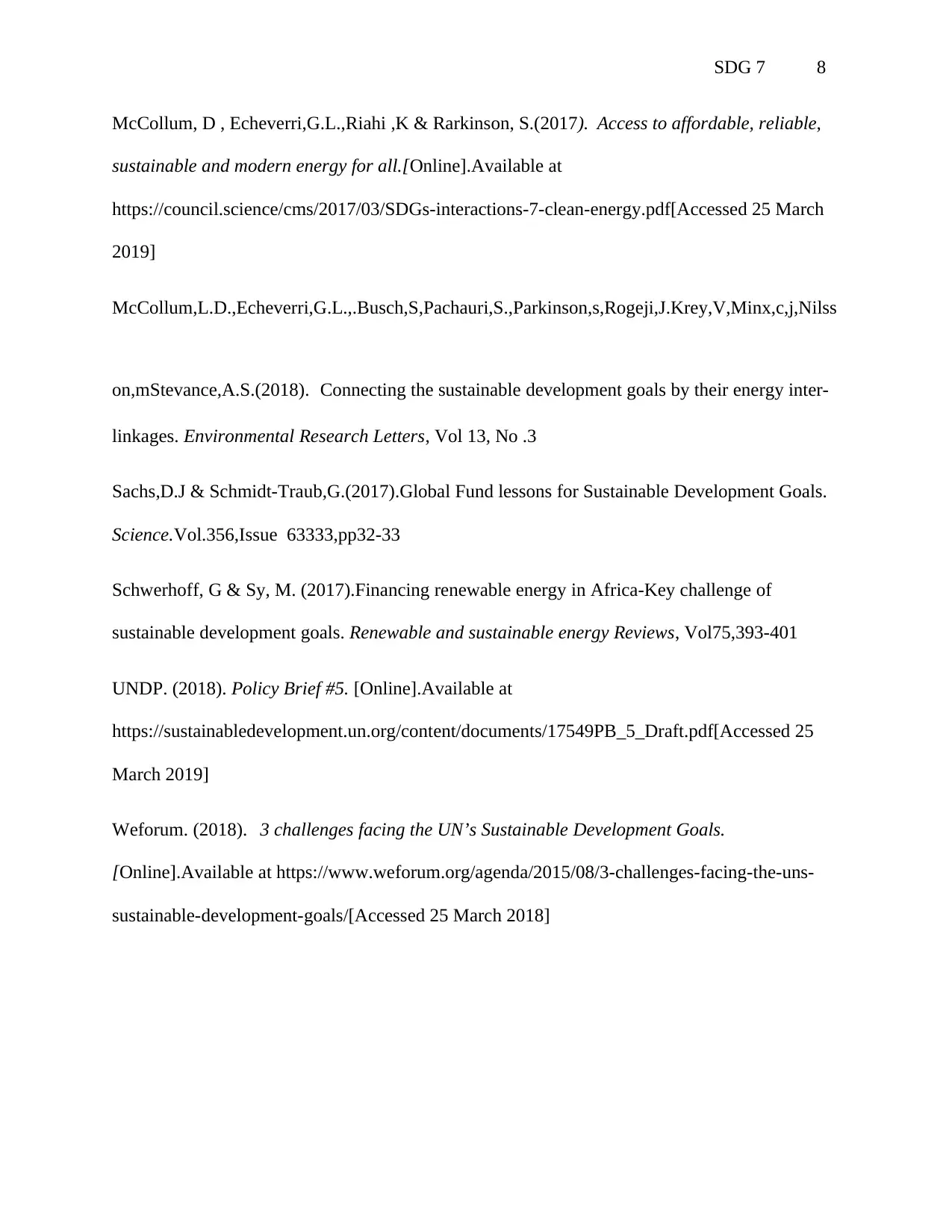
SDG 7 8
McCollum, D , Echeverri,G.L.,Riahi ,K & Rarkinson, S.(2017). Access to affordable, reliable,
sustainable and modern energy for all.[Online].Available at
https://council.science/cms/2017/03/SDGs-interactions-7-clean-energy.pdf[Accessed 25 March
2019]
McCollum,L.D.,Echeverri,G.L.,.Busch,S,Pachauri,S.,Parkinson,s,Rogeji,J.Krey,V,Minx,c,j,Nilss
on,mStevance,A.S.(2018). Connecting the sustainable development goals by their energy inter-
linkages. Environmental Research Letters, Vol 13, No .3
Sachs,D.J & Schmidt-Traub,G.(2017).Global Fund lessons for Sustainable Development Goals.
Science.Vol.356,Issue 63333,pp32-33
Schwerhoff, G & Sy, M. (2017).Financing renewable energy in Africa-Key challenge of
sustainable development goals. Renewable and sustainable energy Reviews, Vol75,393-401
UNDP. (2018). Policy Brief #5. [Online].Available at
https://sustainabledevelopment.un.org/content/documents/17549PB_5_Draft.pdf[Accessed 25
March 2019]
Weforum. (2018). 3 challenges facing the UN’s Sustainable Development Goals.
[Online].Available at https://www.weforum.org/agenda/2015/08/3-challenges-facing-the-uns-
sustainable-development-goals/[Accessed 25 March 2018]
McCollum, D , Echeverri,G.L.,Riahi ,K & Rarkinson, S.(2017). Access to affordable, reliable,
sustainable and modern energy for all.[Online].Available at
https://council.science/cms/2017/03/SDGs-interactions-7-clean-energy.pdf[Accessed 25 March
2019]
McCollum,L.D.,Echeverri,G.L.,.Busch,S,Pachauri,S.,Parkinson,s,Rogeji,J.Krey,V,Minx,c,j,Nilss
on,mStevance,A.S.(2018). Connecting the sustainable development goals by their energy inter-
linkages. Environmental Research Letters, Vol 13, No .3
Sachs,D.J & Schmidt-Traub,G.(2017).Global Fund lessons for Sustainable Development Goals.
Science.Vol.356,Issue 63333,pp32-33
Schwerhoff, G & Sy, M. (2017).Financing renewable energy in Africa-Key challenge of
sustainable development goals. Renewable and sustainable energy Reviews, Vol75,393-401
UNDP. (2018). Policy Brief #5. [Online].Available at
https://sustainabledevelopment.un.org/content/documents/17549PB_5_Draft.pdf[Accessed 25
March 2019]
Weforum. (2018). 3 challenges facing the UN’s Sustainable Development Goals.
[Online].Available at https://www.weforum.org/agenda/2015/08/3-challenges-facing-the-uns-
sustainable-development-goals/[Accessed 25 March 2018]
⊘ This is a preview!⊘
Do you want full access?
Subscribe today to unlock all pages.

Trusted by 1+ million students worldwide
1 out of 9
Related Documents
Your All-in-One AI-Powered Toolkit for Academic Success.
+13062052269
info@desklib.com
Available 24*7 on WhatsApp / Email
![[object Object]](/_next/static/media/star-bottom.7253800d.svg)
Unlock your academic potential
Copyright © 2020–2026 A2Z Services. All Rights Reserved. Developed and managed by ZUCOL.



